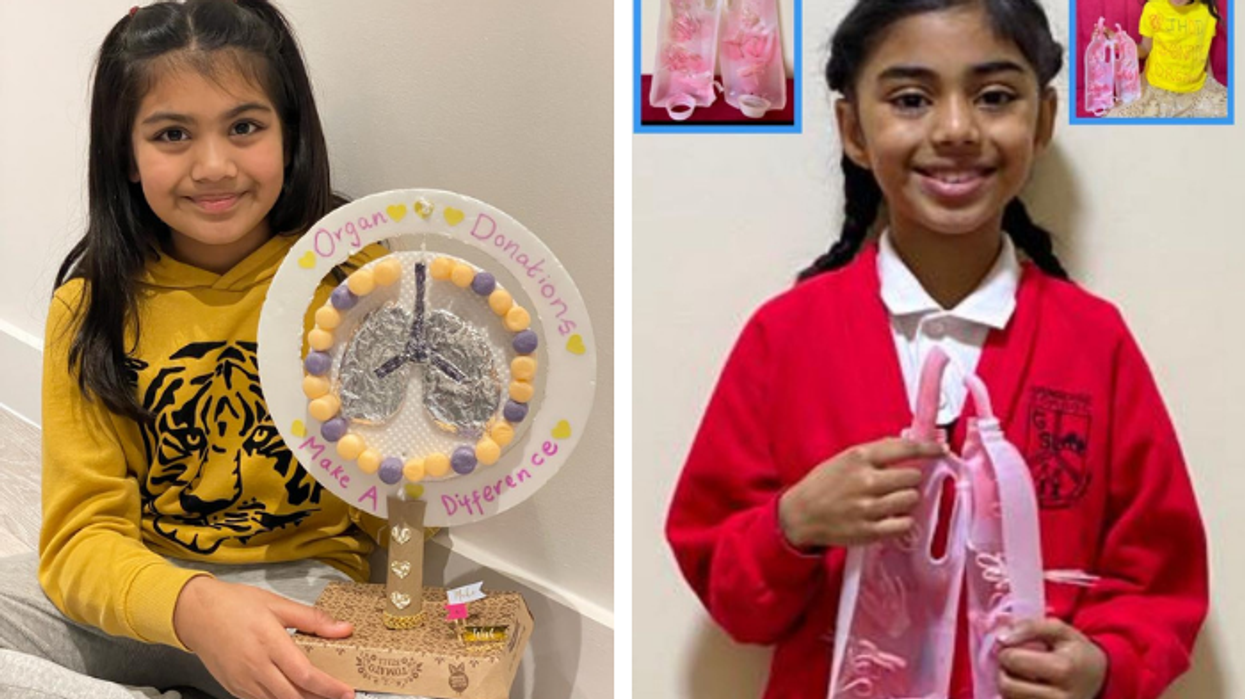NINE-YEAR-OLD Nia Shah has won a national arts competition – ‘Bringing Light Into Life’ – which was organised during Diwali celebrations to raise awareness about organ donation.
The innovative contest was held by The Jain and Hindu Organ Donation Steering Group (JHOD), the UK, in partnership with NHS Blood and Transplant (NHSBT).
The competition saw participants aged between four and 18 years across the UK who used their creative imagination to transform plastic waste such as milk bottles and sweet wrappers into a sculpture or mural depicting organs or tissues that can be donated.
Nia made a three-dimensional sculpture depicting the lungs that came to life and was made with various recycling materials.
While she was adjudged the overall winner of the competition, seven-year-old Mia Taylor was the winner in the four-seven-year age category; Aarna Jain, eight, was the winner in the eight-eleven-year age category and Ria Shah, 12, in the 12-18 age category.
Mia made a fluttering heart while Aarna made kidneys and Ria a mural of lungs.
The winners were announced last week.
Nia said after winning the contest, “I’m overwhelmed that my 3D sculpture was chosen as an overall winner in the Jain and Hindu Organ Donation Steering Group’s competition. I hope my art reaches many people and they think of donating their organs which will bring light and colours in the life of those in need.
“We’ve been learning about organ donation recently at school. I am extremely proud that I took part and whilst making the model it gave me a chance to learn about organ donation and recycling and their importance. Thank you so much for this opportunity.”
Kirit Modi, chair of JHOD and of the panel of judges who met earlier in December, said, “The judges were delighted by the quality and level of creativity of all entries in our competition this year. It is heartening to see young people are thinking about organ donation as a form of recycling and helping others. It is important to raise awareness of organ donation from an early age in order to help as many people as possible from our communities waiting for a transplant.”
Deepa, the mother of Mia, the youngest winner of the competition, said, “It was an amazing competition and a great way to create awareness about organ donation in the younger generation. Mia really enjoyed making her creation of the heart. It’s very close to our hearts as my father received a liver transplant. It was a great way to explain to Mia about the importance of organ donation in saving lives.”
Aarna recorded a video and said, “I choose to reuse and recycle – whether it is organs or plastics we use every day. Donating your organs – including some whilst you are alive – helps save and transform lives of desperately ill people. It really is the ultimate in recycling. My Lung donation sculpture gave me the opportunity to learn more about both recycling and organ donation – I support both.”
Riya said, “I am very grateful for this opportunity to help raise awareness of organ donation and its importance using plastic and other recycled materials. I also learnt a lot of new things by taking part and it has given me immense happiness that I have made the sculpture from the plastic.”
The JHOD Diwali competition’s theme was chosen to demonstrate the importance of organ donation as a form of recycling and reminding young people the need to live sustainability.
The competition also aimed at sparking a life-saving conversation about organ donation amongst the South Asian communities.
There is an urgent shortage of organ donors from ethnic minorities in the UK, and sadly, of the 7,000 people waiting for an organ transplant, 725 are from South Asian backgrounds, as said by the NHSBT Black and Asian Transplant Report published in August.
Every day, around three persons who could have benefited from a transplant die across the UK because there aren’t enough organ donors.
One donor can save or transform up to nine lives through organ donation and save and transform even more by donating tissue.
While figures from the NHSBT’s annual report into organ donation and transplantation in Asian communities reveal promising rise in consent rates and an increase in those from BAME backgrounds being eligible to donate, family refusal continues to be the biggest obstacle to organ donation amongst the communities.
For more information on organ donation, click here.




